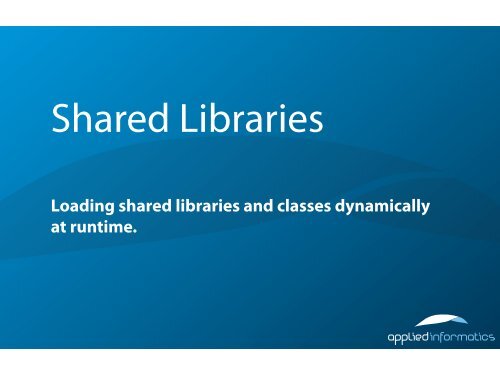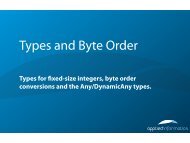Loading shared libraries and classes dynamically at runtime. - Poco
Loading shared libraries and classes dynamically at runtime. - Poco
Loading shared libraries and classes dynamically at runtime. - Poco
Create successful ePaper yourself
Turn your PDF publications into a flip-book with our unique Google optimized e-Paper software.
Shared Libraries<br />
<strong>Loading</strong> <strong>shared</strong> <strong>libraries</strong> <strong>and</strong> <strong>classes</strong> <strong>dynamically</strong><br />
<strong>at</strong> <strong>runtime</strong>.
Overview<br />
> Shared Libraries<br />
> The Class Loader
Shared Libraries<br />
> Most modern pl<strong>at</strong>forms provide facilities to load program<br />
modules in the form of <strong>shared</strong> <strong>libraries</strong> (dynamic link <strong>libraries</strong>) <strong>at</strong><br />
<strong>runtime</strong>.<br />
> Windows provides a LoadLibrary() function, most Unix pl<strong>at</strong>forms<br />
have dlopen().<br />
> To use a <strong>dynamically</strong> loaded <strong>shared</strong> library, an entry point<br />
(address of a function) into the library must be found. The<br />
address can then be casted to an appropri<strong>at</strong>e function pointer,<br />
<strong>and</strong> the function can be called.
The SharedLibrary Class<br />
> <strong>Poco</strong>::SharedLibrary is POCO's interface to the oper<strong>at</strong>ing system's<br />
dynamic linker/loader.<br />
> #include "<strong>Poco</strong>/SharedLibrary.h"<br />
> <strong>Poco</strong>::SharedLibrary provides low-level functions for loading a<br />
<strong>shared</strong> library, for looking up the address of a symbol, <strong>and</strong> for<br />
unloading a <strong>shared</strong> library.
SharedLibrary Functions<br />
> void load(const std::string& p<strong>at</strong>h)<br />
loads the <strong>shared</strong> library from the given p<strong>at</strong>h<br />
> void unload()<br />
unloads the <strong>shared</strong> library<br />
> bool hasSymbol(const std::string& name)<br />
returns true if the library contains a symbol with the given name<br />
> void* getSymbol(const std::string& name)<br />
returns the address of the symbol with the given name. For a<br />
function, this is the entry point of the function. To call the<br />
function, cast to a function pointer <strong>and</strong> call through it.
TestLibrary.cpp<br />
#include <br />
#if defined(_WIN32)<br />
#define LIBRARY_API __declspec(dllexport)<br />
#else<br />
#define LIBRARY_API<br />
#endif<br />
extern "C" void LIBRARY_API hello();<br />
void hello()<br />
{<br />
std::cout
LibraryLoaderTest.cpp<br />
#include "<strong>Poco</strong>/SharedLibrary.h"<br />
using <strong>Poco</strong>::SharedLibrary;<br />
typedef void (*HelloFunc)(); // function pointer type<br />
int main(int argc, char** argv)<br />
{<br />
std::string p<strong>at</strong>h("TestLibrary");<br />
p<strong>at</strong>h.append(SharedLibrary::suffix()); // adds ".dll" or ".so"<br />
SharedLibrary library(p<strong>at</strong>h); // will also load the library<br />
HelloFunc func = (HelloFunc) library.getSymbol("hello");<br />
func();<br />
library.unload();<br />
}<br />
return 0;
The Class Loader<br />
> <strong>Poco</strong>::ClassLoader is POCO's high level interface for loading<br />
<strong>classes</strong> from <strong>shared</strong> <strong>libraries</strong>. It is well suited for implementing<br />
typical plug-in architectures.<br />
> #include "<strong>Poco</strong>/ClassLoader.h"<br />
> All <strong>classes</strong> loaded with a specific class loader must be sub<strong>classes</strong><br />
of a common base class. <strong>Poco</strong>::ClassLoader is a class templ<strong>at</strong>e<br />
th<strong>at</strong> must be instanti<strong>at</strong>ed for the base class.<br />
> A base class is necessary because the applic<strong>at</strong>ion loading a<br />
plugin needs an interface to access it.
The Class Loader (cont'd)<br />
> A <strong>shared</strong> library th<strong>at</strong> is used with the class loader can only export<br />
<strong>classes</strong> th<strong>at</strong> have a common base class.<br />
> However, this is not really a restriction, because the exported<br />
class can be a factory for objects of arbitrary <strong>classes</strong>.<br />
> A <strong>shared</strong> library used with the class loader exports a Manifest<br />
describing all <strong>classes</strong> exported by the library.<br />
> Furthermore, the <strong>shared</strong> library must export specific functions<br />
th<strong>at</strong> are used by the class loader.<br />
> POCO provides macros th<strong>at</strong> autom<strong>at</strong>e the implement<strong>at</strong>ion of<br />
these functions.
Manifest <strong>and</strong> MetaObject<br />
> A library's Manifest maintains a list of all <strong>classes</strong> contained in a<br />
<strong>dynamically</strong> loadable class library.<br />
> It manages th<strong>at</strong> inform<strong>at</strong>ion as a collection of meta objects.<br />
> A MetaObject manages the lifetime of objects of a given class. It<br />
is used to cre<strong>at</strong>e instances of a class, <strong>and</strong> to delete them.<br />
> As a special fe<strong>at</strong>ure, class <strong>libraries</strong> can export singletons.
The MetaObject Class<br />
> MetaObject is a class templ<strong>at</strong>e, instanti<strong>at</strong>ed with<br />
the class it maintains, <strong>and</strong> its lowest base class.<br />
> MetaObject is derived from<br />
AbstractMetaObject.<br />
> A MetaObject can be used to cre<strong>at</strong>e new instances of a class<br />
(unless the class is exported as a singleton).<br />
> Like a AutoReleasePool, a MetaObject can take care of no longer<br />
needed objects.<br />
> A MetaObject can manage singletons.
The MetaObject Class (cont'd)<br />
> const char* name()<br />
returns the name of the class<br />
> Base* cre<strong>at</strong>e() const<br />
cre<strong>at</strong>es a new instance of Class, unless it's a singleton.<br />
> Base& instance() const<br />
returns a reference to the one <strong>and</strong> only instance of a singleton.<br />
> bool canCre<strong>at</strong>e() const<br />
returns true if new instances can be cre<strong>at</strong>ed (false if the class is a<br />
singleton).
The MetaObject Class (cont'd)<br />
> Base* autoDelete(Base* pObject)<br />
give ownership of pObject to the MetaObject. The MetaObject<br />
will delete all object it owns when it's destroyed.<br />
> bool isAutoDelete(Base* pObject)<br />
returns true if the MetaObject owns pObject, false otherwise.<br />
> void destroy(Base* pObject)<br />
if the MetaObject owns pObject, it will be immedi<strong>at</strong>ely deleted.
The MetaSingletonClass<br />
> This is a sister class of MetaObject used for managing singletons.<br />
> It has the same interface as MetaObject.
The Manifest Class<br />
> <strong>Poco</strong>::Manifest basically is a collection of meta objects.<br />
> #include "<strong>Poco</strong>/Manifest.h"<br />
> <strong>Poco</strong>::Manifest::Iter<strong>at</strong>or is used to iter<strong>at</strong>e over its meta objects.<br />
> Manifest::Iter<strong>at</strong>or find(const std::string& className)<br />
returns an iter<strong>at</strong>or pointing to the meta object for the given class,<br />
or an end iter<strong>at</strong>or if the class is not found.<br />
> Manifest::Iter<strong>at</strong>or begin() const<br />
Manifest::Iter<strong>at</strong>or end() const<br />
return the begin, <strong>and</strong> end iter<strong>at</strong>or, respectively.
Writing a Class Library<br />
> For a class library to work with the class loader, it must export a<br />
manifest.<br />
> The class library must provide a function<br />
bool pocoBuildManifest(ManifestBase* pManifest)<br />
th<strong>at</strong> builds a manifest for the library.<br />
> The <strong>Poco</strong>/ClassLibrary.h header file provides macros to<br />
autom<strong>at</strong>ically implement this function for a class library.<br />
> Optionally, a class library can export an initializ<strong>at</strong>ion <strong>and</strong> a clean<br />
up function.
Writing a Class Library (cont'd)<br />
> These macros are used as follows:<br />
POCO_BEGIN_MANIFEST(MyBaseClass)<br />
POCO_EXPORT_CLASS(MyFirstClass)<br />
POCO_EXPORT_CLASS(MySecondClass)<br />
POCO_EXPORT_SINGLETON(MySingleton)<br />
POCO_END_MANIFEST<br />
> A class library can export a setup <strong>and</strong> a cleanup function:<br />
void pocoInitializeLibrary()<br />
void pocoUninitializeLibrary()<br />
which will be called by the class loader, if present.
The Class Loader (again)<br />
> A ClassLoader maintains a collection of class <strong>libraries</strong>, as well as<br />
their manifests.<br />
> void loadLibrary(const std::string& p<strong>at</strong>h)<br />
loads a class library into memory <strong>and</strong> runs the set up function, if<br />
it's present.<br />
> void unloadLibrary(const std::string& p<strong>at</strong>h)<br />
unloads a class library after running the clean up function.<br />
> Never unload a class library if there are still objects<br />
from this library around in memory.<br />
!
The Class Loader (again, cont'd)<br />
> const Meta* findClass(const std::string& className) const<br />
looks for the meta object for the given class in all loaded <strong>libraries</strong>.<br />
Returns a pointer to the meta object if found, null otherwise.<br />
> const Meta& classFor(const std::string& className)<br />
similar to findClass(), but throws a NotFoundException if the class<br />
is not known.<br />
> Base* cre<strong>at</strong>e(const std::string& className)<br />
cre<strong>at</strong>es a new instance of a class or throws a NotFoundException<br />
if the class is unknown.
The Class Loader (again, cont'd)<br />
> Base& instance(const std::string& className)<br />
returns a reference to the only instance of a singleton class or<br />
throws a NotFoundException if the class is unknown.<br />
> Iter<strong>at</strong>or begin() const<br />
Iter<strong>at</strong>or end() const<br />
return a begin/end iter<strong>at</strong>or for iter<strong>at</strong>ing over the manifests of all<br />
loaded <strong>libraries</strong>. Dereferencing the iter<strong>at</strong>or will return a pointer to<br />
a std::pair containing the p<strong>at</strong>h of the class library <strong>and</strong> a pointer to<br />
its manifest.<br />
> Please see the reference document<strong>at</strong>ion for other member<br />
functions.
AbstractPlugin.h<br />
//<br />
// This is used both by the class library <strong>and</strong> by the applic<strong>at</strong>ion.<br />
#ifndef AbstractPlugin_INCLUDED<br />
#define AbstractPlugin_INCLUDED<br />
class AbstractPlugin<br />
{<br />
public:<br />
AbstractPlugin();<br />
virtual ~AbstractPlugin();<br />
virtual std::string name() const = 0;<br />
};<br />
#endif // AbstractPlugin.h
AbstractPlugin.cpp<br />
//<br />
// This is used both by the class library <strong>and</strong> by the applic<strong>at</strong>ion.<br />
#include "AbstractPlugin.h"<br />
AbstractPlugin::AbstractPlugin()<br />
{<br />
}<br />
AbstractPlugin::~AbstractPlugin()<br />
{<br />
}
PluginLibrary.cpp<br />
#include "AbstractPlugin.h"<br />
#include "<strong>Poco</strong>/ClassLibrary.h"<br />
#include <br />
class PluginA: public AbstractPlugin<br />
{<br />
public:<br />
std::string name() const<br />
{<br />
return "PluginA";<br />
}<br />
};<br />
class PluginB: public AbstractPlugin<br />
{<br />
public:<br />
std::string name() const<br />
{<br />
return "PluginB";<br />
}<br />
};
POCO_BEGIN_MANIFEST(AbstractPlugin)<br />
POCO_EXPORT_CLASS(PluginA)<br />
POCO_EXPORT_CLASS(PluginB)<br />
POCO_END_MANIFEST<br />
// optional set up <strong>and</strong> clean up functions<br />
void pocoInitializeLibrary()<br />
{<br />
std::cout
main.cpp<br />
#include "<strong>Poco</strong>/ClassLoader.h"<br />
#include "<strong>Poco</strong>/Manifest.h"<br />
#include "AbstractPlugin.h"<br />
#include <br />
typedef <strong>Poco</strong>::ClassLoader PluginLoader;<br />
typedef <strong>Poco</strong>::Manifest PluginManifest;<br />
int main(int argc, char** argv)<br />
{<br />
PluginLoader loader;<br />
std::string libName("PluginLibrary");<br />
libName += <strong>Poco</strong>::SharedLibrary::suffix(); // append .dll or .so<br />
loader.loadLibrary(libName);
PluginLoader::Iter<strong>at</strong>or it(loader.begin());<br />
PluginLoader::Iter<strong>at</strong>or end(loader.end());<br />
for (; it != end; ++it)<br />
{<br />
std::cout begin());<br />
PluginManifest::Iter<strong>at</strong>or endMan(it->second->end());<br />
for (; itMan != endMan; ++itMan)<br />
std::cout name()
Copyright © 2006-2010 by Applied Inform<strong>at</strong>ics Software Engineering GmbH.<br />
Some rights reserved.<br />
www.appinf.com | info@appinf.com<br />
T +43 4253 32596 | F +43 4253 32096
















